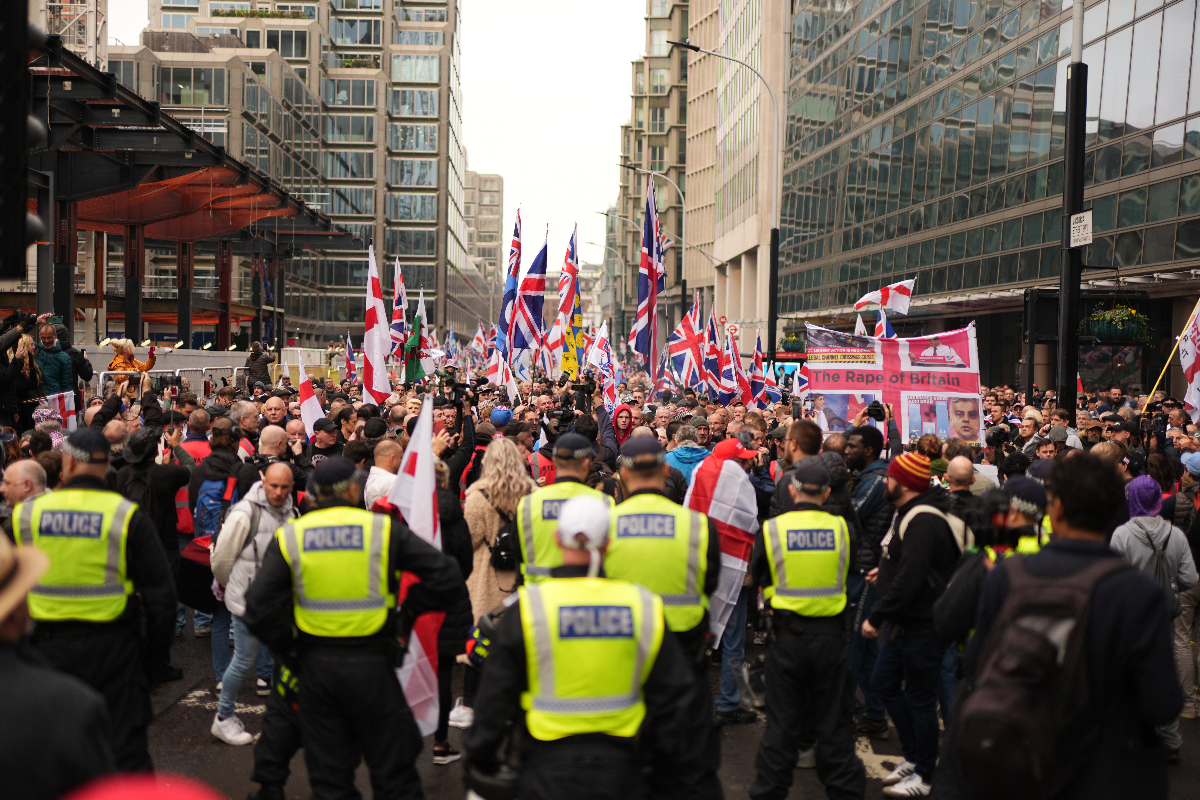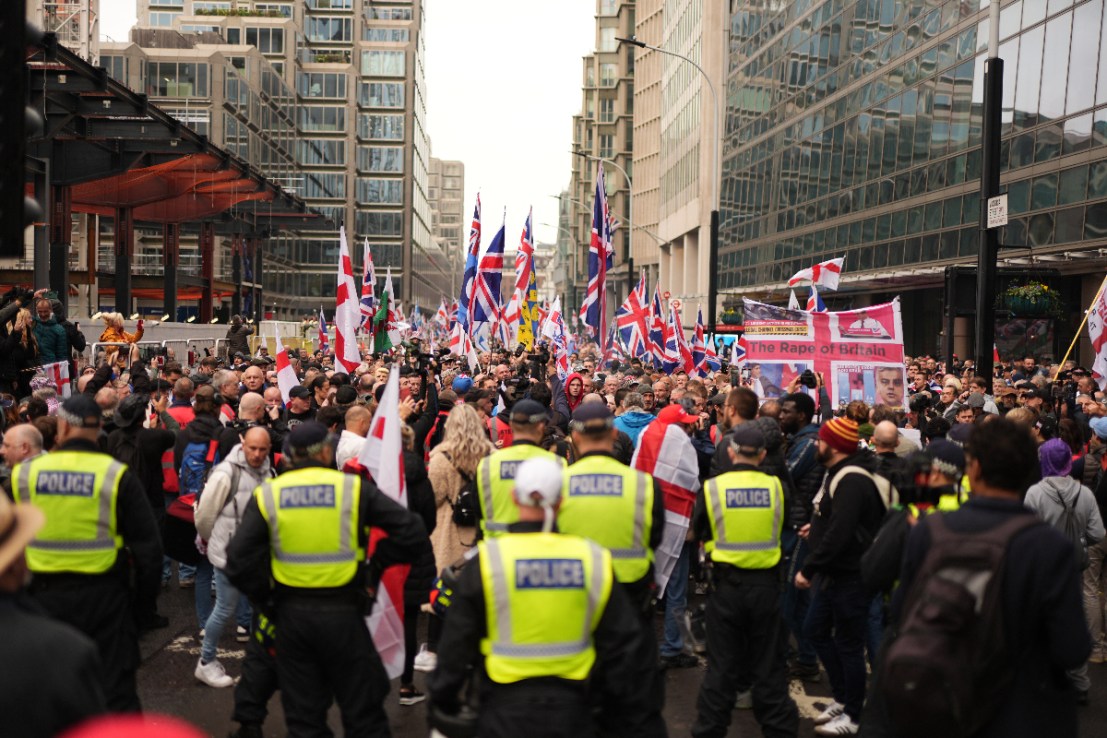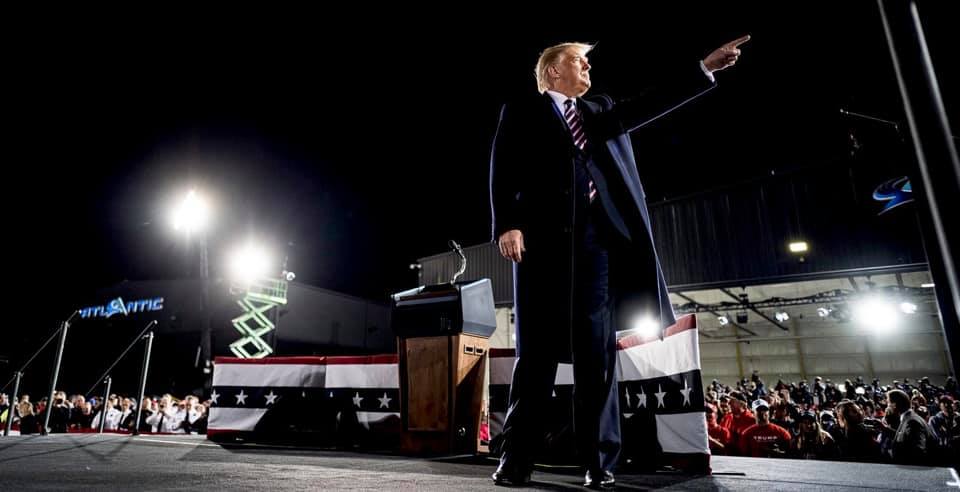Hundreds gather for Tommy Robinson’s protest which he will miss in custody
Hundreds of Tommy Robinson supporters are gathering in central London for a planned protest which the political activist will miss after he was remanded into custody by police. Chants of “Oh Tommy, Tommy” and “We want Starmer out” were heard outside Victoria station ahead of the Unite The Kingdom rally on Saturday. The demonstration is [...]


Hundreds of Tommy Robinson supporters are gathering in central London for a planned protest which the political activist will miss after he was remanded into custody by police.
Chants of “Oh Tommy, Tommy” and “We want Starmer out” were heard outside Victoria station ahead of the Unite The Kingdom rally on Saturday.
The demonstration is expected to be met with a counter-protest organised by Stand Up to Racism, which has called on its supporters to “take to the streets” in a “massive anti-fascist demonstration”.
And a few hundred people have gathered on the corner of Trafalgar Square ahead of the planned United Families and Friends Campaign protest, with activists holding signs reading “No justice”, “no-one forgotten, nothing forgiven” and “no to hatred, no to fascism”.
Robinson, 41, whose real name is Stephen Yaxley-Lennon, is accused of being in contempt of court after the airing of a film at a protest in Trafalgar Square in July.
He attended Folkestone police station on Friday where he was remanded ahead of a hearing at Woolwich Crown Court on Monday concerning allegations that he breached a 2021 High Court order barring him from repeating libellous allegations against a Syrian refugee who successfully sued him.
It is understood the airing of a film, titled Silenced, at the Trafalgar Square demonstration is one of six actions alleged to have breached the injunction between June and July.
The film is also pinned to the top of his X account.
Robinson was separately charged on Friday with failing to provide his mobile phone access code to police under Schedule 7 of the Terrorism Act 2000, Kent Police said.
The Metropolitan Police and British Transport Police are being supported by officers from other forces across the country for the protests on Saturday, and the Met said there will be a “significant police presence” to ensure the two groups are kept apart.
Those attending the protest organised by Robinson have begun to march from Victoria station to the southern end of Whitehall, while the counter-protest is expected to begin at Regent Street St James’s and finish at the northern end of Whitehall.
The Met said static rallies are expected at the end of both marches.
Many demonstrators on Robinson’s march hoisted Union and England flags – with several Make America Great Again flags in support of Donald Trump also in the crowd.
Some demonstrators wore “I am Peter Lynch” badges, in reference to a 61-year-old man who died in prison after being jailed for screaming abuse at riot police outside a hotel housing asylum seekers.
The PA news agency understands Robinson will be held in custody in Folkestone until his court hearing on Monday.
He was released on unconditional bail in July and subsequently left the country, with Adam Payter, representing the Solicitor General, telling the High Court there “was nothing to prevent him from doing so”.
Mr Justice Johnson issued a warrant for Robinson’s arrest but ordered that it not be carried out “until early October” to allow Robinson time to indicate that he would attend the next hearing voluntarily or to apply to “set aside” the warrant.
Robinson posted a video of himself arriving at Luton Airport on October 20 and said he was surprised he had not been arrested.
He applied to set aside the warrant but his application was dismissed by Mr Justice Johnson on Friday.
The separate charge under the Terrorism Act relates to his arrest in July at a port in Kent, where he was accused of “frustration” of police counter-terrorism powers.
He allegedly failed to provide his mobile phone access code to officers at the Channel Tunnel in Folkestone.
Under Schedule 7 of the Terrorism Act, police are allowed to stop anyone passing through a UK port “to determine whether they may be involved or concerned in the commission, preparation or instigation of acts of terrorism”.
The person who is detained can be held for up to six hours, is legally obliged to answer questions and must provide the password or access number for electronic devices, or be held to have committed a criminal offence if they refuse.
Robinson said he objected to a request from police for the number to his phone because there was privileged information on the device relating to an ongoing High Court case.
Press Association – William Warnes, Sam Hall and Jordan Reynolds



